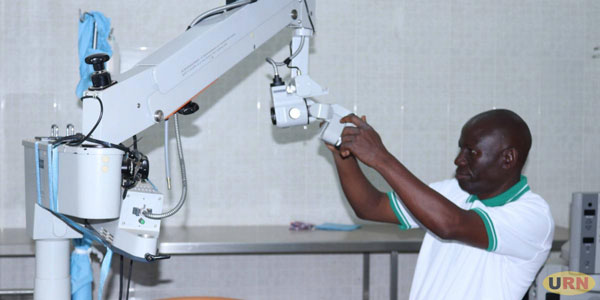
Kampala, Uganda | THE INDEPENDENT | Despite the donation of state-of-the-art eye treatment equipment to Luwero Hospital in 2017 by German organizations, the equipment remains unutilized due to the absence of a specialist to perform eye operations on patients.
Bazungu e.V and Augen Klinik Ahaus Hospital, both German organizations donated the eye equipment to the hospital’s eye clinic after conducting an eye camp where they encountered an overwhelming number of patients in need of treatment.
However, the eye equipment has been left idle and covered with clothes as the eye clinic only provides minor checkups and treatment due to the lack of an Ophthalmologist—a specialist in eye and vision care. Dr. Steven Magera, the Medical Superintendent of Luwero Hospital, explains that the hospital’s staffing norms do not include provisions for an eye specialist, making it challenging to recruit one to utilize the equipment effectively.
To address this issue, the hospital has decided to organize regular eye camps where visiting specialists can conduct operations on patients and make use of the equipment. In 2022, three eye camps were organized, attracting over 350 patients from Luwero, Nakaseke, Nakasongola, Kiryadongo, and other districts.
Dr. Magera further mentions that an upcoming eye camp is scheduled for June 11th-12th, where visiting eye specialists will perform surgeries on patients suffering from cataracts. The hospital intends to request special consideration to be granted permission to recruit permanent eye specialists who can utilize the equipment and treat patients effectively.
Henry Namakola, the hospital health educator and coordinator of the eye camp, emphasizes that surgeries for cataracts can cost over one million shillings per eye in private hospitals. The eye camp provides an opportunity, particularly for the underprivileged, to receive these services free of charge. Namakola also highlights the increasing number of cataract patients due to factors such as poor nutrition, age, and conditions like high blood pressure.
According to the Ministry of Health, cataracts account for 57% of blindness cases in the country, despite being a treatable condition. Cataracts involve the clouding of the crystalline lens of the eye.
****
URN
 The Independent Uganda: You get the Truth we Pay the Price
The Independent Uganda: You get the Truth we Pay the Price


